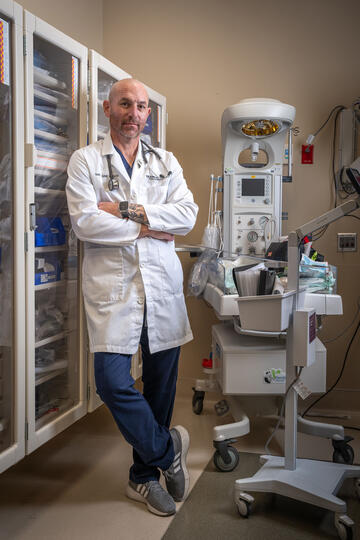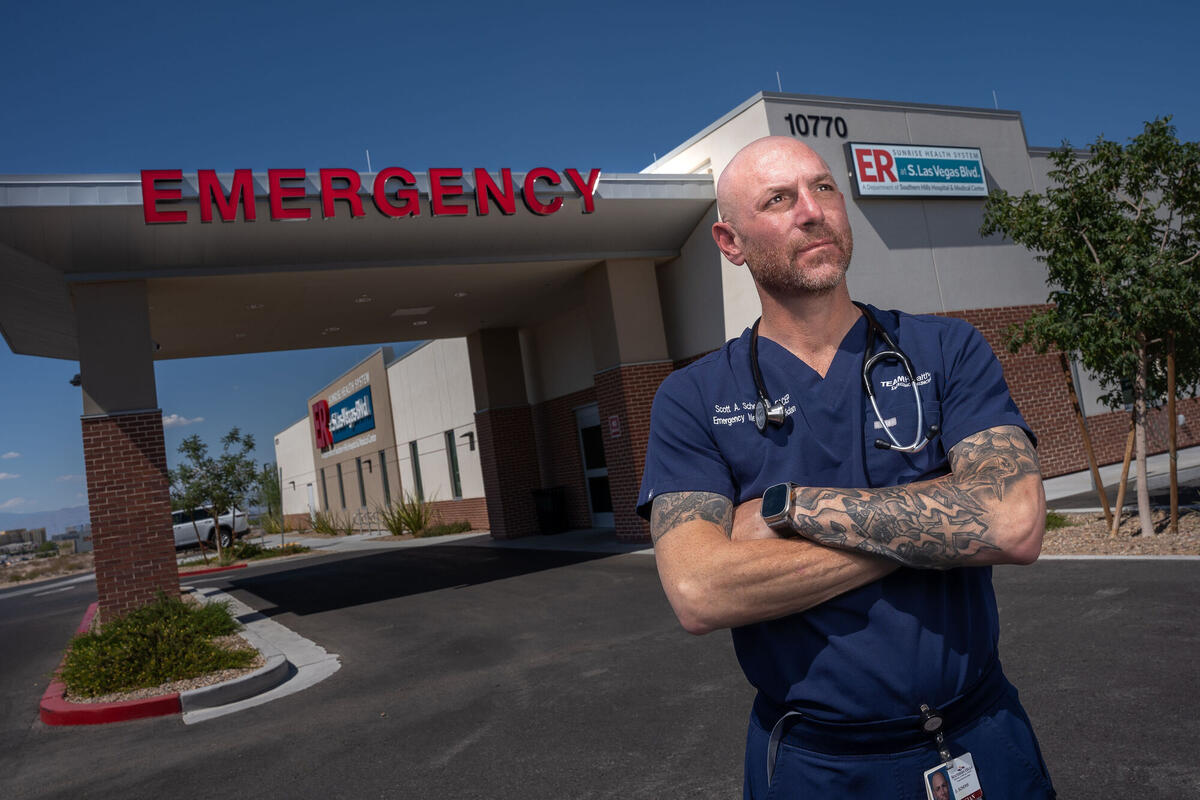Scott A. Scherr
School of Integrated Health Sciences Alumnus of the Year
Ask anyone who has played baseball at an elite level, and they’ll tell you that learning to hit a curveball requires countless hours of practice. But there was no way for Scott Scherr to prepare for the curveball he faced as a member of the UNLV baseball team in the early 1990s.
Following his sophomore season, Scherr — who played catcher — began feeling discomfort in his right shoulder. When the pain didn’t subside, he sought medical attention.
Official diagnosis: torn supraspinatus tendon, which is part of the rotator cuff.
Surgery and extensive rehabilitation were required if he wanted to continue his baseball career — and even then, there were no guarantees.
Scherr opted to hang up his baseball spikes.
“It was a difficult decision,” Scherr says. “I was more afraid of disappointing my father who poured his heart and energy into my baseball career and is my biggest fan, but he supported my decision and told me I would go on to do great things.”
Scherr’s father knocked that prediction out of the park.
With his competitive baseball days behind him, Scherr turned his entire focus to academics, eventually graduating from UNLV with a degree in radiography. Soon after, it was off to University Medical Center for clinical rotations as an X-ray technician.
First stop: emergency department.
“When I saw the ER doctors making fast, life-saving decisions, I was awestruck,” Scherr says. “At that moment I told myself, ‘I want to do that!’
Scherr applied and was accepted to the University of Nevada School of Medicine, where he completed his degree in 2003. He then did his residence training at Emory University in Atlanta, becoming chief resident in 2006.

In the nearly two decades since, Scherr has worked in emergency medicine and as an administrator for various hospitals and medical centers in Las Vegas, Georgia, and California. That includes a five-year stint as medical director at Sunrise Hospital and Medical Center in Las Vegas, and his current role as medical director for the Clark County Fire Department.
Additionally, Scherr is currently chief medical officer for Vegas IV, which provides intravenous therapy for Southern Nevada residents and tourists. He also manages 14 emergency medicine and hospital medicine programs in Nevada and California.
While most of Scherr’s time is now spent in administrative and leadership roles, he’s still faithful to his first love, working 80-100 clinical hours monthly as an emergency physician.
He also remains faithful to his alma mater as a regular UNLV donor.
Looking back on your time at UNLV, what were some of the most impactful moments that helped set you on your career path?
My first clinical experience at UMC shaped my decision to go into medicine. Also, my experience playing baseball gave me important leadership qualities that I rely on to this day. I bring the “team” approach to lead a group of more than 300 physicians and advanced practice clinicians.
UNLV students and alumni are encouraged to embrace their “Rebel spirit” — to be daring, take chances and resist convention. Describe a moment where your “Rebel spirit” was on full display.
I’ll go back to my time playing baseball at UNLV and being faced with a career change due to an injury. I loved baseball and having it taken away from me was painful. But I summoned my “Rebel spirit,” knowing that eventually I would discover another passion — and that turned out to be emergency medicine.
I continue to bleed scarlet and gray every day, and I deploy that “Rebel spirit” to impact patients, families, and the community I serve.
You were the medical director at Sunrise Hospital the night of the 1 October tragedy that claimed the lives of 58 victims and injured hundreds more. Many of those who were shot were transported to Sunrise for treatment. Can you describe how that impacted you moving forward?On 1 October, I witnessed true heroism in our community. More than 100 doctors and 200 nurses, plus ancillary staff, responded to Sunrise Hospital’s call for assistance and worked around the clock.
We cared for more than 250 patients, and the courage and skill of our entire medical team saved lives that otherwise would have been lost. The response of our community’s health care workers that night is something I’ll never forget. It’s why I will always take pride in the motto “Vegas Strong."



